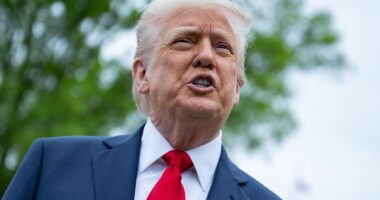WASHINGTON — President Donald Trump announced tariffs on auto imports on Wednesday. The White House argues that this will support domestic manufacturing. However, it could also create financial challenges for automakers that rely on global supply chains.
White House press secretary Karoline Leavitt deferred to the President to provide more details on the plans to impose taxes on foreign-made cars and parts. This could be complex as U.S. automakers also source components globally.
Trump is granting an exemption on his stiff new tariffs on imports for U.S. automakers, amid fears that the trade war could harm U.S. manufacturers
Following the announcement, General Motors’ shares dropped by approximately 1.7% in Wednesday afternoon trading. Ford’s stock also declined by around 1.2%, while Stellantis, the parent company of Jeep and Chrysler, saw a 2% decrease in its shares.
Trump has long said that tariffs against auto imports would be a defining policy of his presidency, betting that the costs created by the taxes would cause more production to relocate in the United States. But U.S. and foreign automakers with domestic plants still depend on Canada, Mexico and other nations for parts and finished vehicles, meaning that auto prices could increase and sales could decline as new factories take time to build.
“We are going to be doing automobiles, which you’ve known about for a long time,” Trump said Monday. “We’ll be announcing that fairly soon, over the next few days probably.”
RELATED: Trump grants 1 month exemption for US automakers from new tariffs on imports from Mexico, Canada
The auto tariffs are part of a broader reshaping of global relations by Trump, who plans to impose what he calls “reciprocal” taxes on April 2 that would match the tariffs, sales taxes charged by other nations.
Trump has already placed a 20% import tax on all imports from China for its role in the production of fentanyl. He similarly placed 25% tariffs on Mexico and Canada, with a lower 10% tax on Canadian energy products. Parts of the Mexico and Canada tariffs have been suspended, including the taxes on autos after automakers objected and Trump responded by giving them a 30-day reprieve that is set to expire in April.
The president has also imposed 25% tariffs on all steel and aluminum imports, removing the exemptions from his earlier 2018 taxes on the metals. He also plans tariffs on computer chips, pharmaceutical drugs, lumber and copper.
His taxes risk igniting a broader global trade war with escalating retaliations that could crush global trade, potentially hurting economic growth while raising prices for families and businesses as some of the costs of the taxes get passed along by importers. When the Europe Union retaliated with plans for a 50% tariff on U.S. spirits, Trump responded by planning a 200% tax on alcoholic beverages from the EU.
Trump’s aides maintain the tariffs on Canada and Mexico are about stopping illegal immigration and drug smuggling. But the administration also wants to use the tariff revenues to lower the budget deficit and assert America’s preeminence as the world’s largest economy.
Leavitt is one of three Trump administration officials who face a lawsuit from The Associated Press on First and Fifth Amendment grounds. The AP says the three are punishing the news agency for editorial decisions they oppose. The White House says the AP is not following an executive order to refer to the Gulf of Mexico as the Gulf of America.
This is a developing story; check back for updates.
Copyright © 2025 by The Associated Press. All Rights Reserved.














